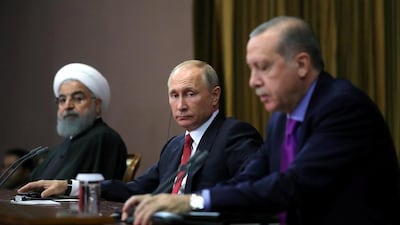For a week in early February 1945, the leaders of the Allied Powers met in Yalta on the Black Sea. There the host, Soviet leader Joseph Stalin and his guests, US president Franklin Roosevelt and British prime minister Winston Churchill, discussed the post-war future of Europe, in particular the fate of Central Europe. They represented the great powers of the world on the verge of winning the most consequential military victory in the history of the world. They were doing what great powers have done throughout history, drawing borders, divvying up the spoils of victory.
On November 22 of this year, 72 years after the Yalta summit and approximately 780 miles away in a different Black Sea resort, Russian president Vladimir Putin hosted another summit. This one was attended by Iran's president Hassan Rouhani and Turkish president Recep Tayyip Erdogan. They too met in the waning days of a brutal and destructive war, this one on a much smaller scale: the conflict that has ravaged Syria for the past six years. And they too played the role of major powers, seeking to set the terms for the peace that would follow. As before, they had their eyes set on an entire region in turmoil, this time, the Middle East.
Despite the fact that the agreement produced in Yalta spoke of free determination and democracy, in retrospect, we know that the meeting lay the groundwork for what became the Soviet takeover of Eastern Europe. Similarly, despite the fact that the language of the Putin-hosted meeting focused on “peace” for Syria, it was also largely about the subtext of the nature of the continued influence of the parties present over peoples who were not represented in the room where the summit was taking place.
One party to Syria's civil war had been consulted. A week earlier, Bashar Al Assad, the Syrian dictator and the author of the mass suffering of his people, had also made a trip to Sochi to meet Putin. That his supporters in Russia and Iran were in a dominant position at the meeting ensured that any "peace deal" that would emerge from it would be as favourable as possible for him. There was a promise of future discussions involving all the parties to the Syria conflict but these should be taken with a large grain of salt much as the discussions of democracy and self-determination were in Yalta.
_________________
Read more by David Rothkopf:
Today’s Middle East has a new look about it. And it is not a comforting one
Trump in the White House: will the great disrupter unsettle America's checks and balances?
Brics is obsolete. It has been overtaken by events
_________________
Rather, as in Yalta, where the Russians were in such a strong position on the issues being discussed that one American negotiator later said, "it was not a question of what we would let the Russians do but what we could get the Russians to do". It was clear the Russians were in the driver's seat here too and that the primary beneficiaries would be not the people of Syria but Mr Al Rouhani's government in Iran. Because, rhetoric and diplomatic niceties aside, just as the Russian goal at Yalta was to extend the influence of their bloc as deep into Europe as possible, their goal this time was to ensure their influence in the Middle East by supporting their Iranian ally's efforts to extend its regional hegemony across the entire northern tier of the Middle East.
Russia wants a buffer between itself and extreme groups from the Middle East and to extend its influence as deep into the region as possible (ideally at the expense of US influence). The recent Russian deal to secure Egyptian air force bases for Russian fighter planes is another example of that strategy. Iran wants governments in Baghdad, Damascus and Beirut that will be compliant and support its agenda against both Sunni nations to the south and Israel. Both advanced their goals in Sochi.
Of course, one of the reasons the Russians were in such a strong position is one of the starkest differences between the meeting in Sochi and that in Yalta. The West was not represented in Sochi. Europe has long ceded its influence in such matters to the US and the US administration of Donald Trump has effectively given its proxy to Putin. Mr Trump consulted Mr Putin and has consistently deferred to him on issues associated with Syria. Further, at the same time as the execution of Russia's Syria initiative, the US announced it would no longer arm Kurdish fighters that had been key allies in the fight against ISIL. This would reduce resistance to the Assad regime but it would also assist the Russians and Iranians in granting Mr Erdogan one of his wishes: to get all sides to agree to contain the strong Kurdish impulses toward self-determination.
In Yalta, Russia got its way because it was the strongest military actor in the region being discussed while the Americans and British were either gullible or did not care to fight for the people of the East. In Sochi, the Russians and Iranians set in motion a plan that will succeed for similar reasons. Both Black Sea meetings will set the geopolitics in the regions being discussed for years to come. Both advanced the geopolitical agendas of their dominant players. And both, I suspect, will be viewed by history infamously as meetings where the rights and interests of those most affected by the decisions taken were not only ignored but were trampled upon.

